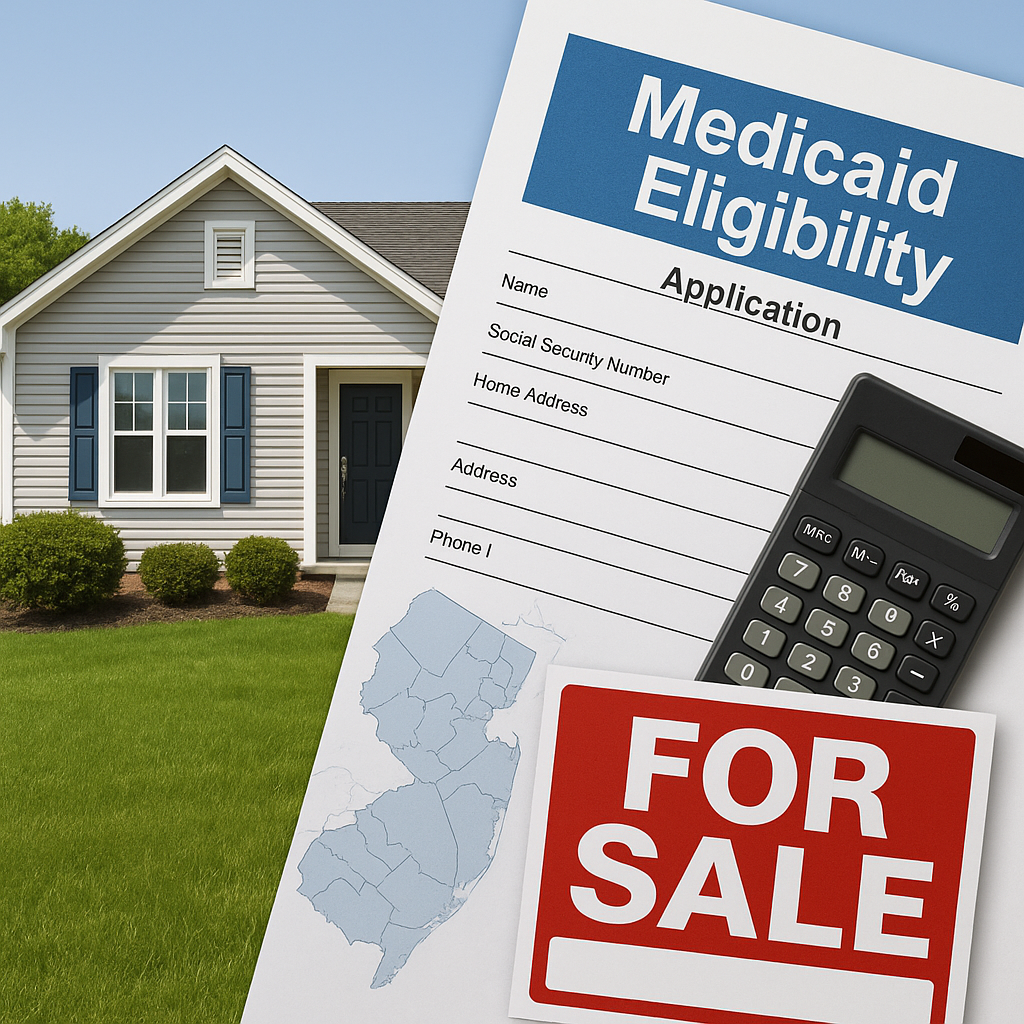
If your aging parent or relative needs long-term care and Medicaid is part of the conversation, the house becomes a critical asset. One wrong move could disqualify your loved one from care or create massive headaches later. This is especially true in New Jersey, where Medicaid rules are strict, and real estate values are high.
This guide explains exactly how to sell a home as part of a Medicaid spend down in New Jersey. It is for families, adult children, and caregivers who want to avoid penalties, plan properly, and protect assets before it is too late.
What Is a Medicaid Spend Down in New Jersey?
A Medicaid spend down happens when someone has too many assets or too much income to qualify for long-term care coverage through Medicaid. In New Jersey, Medicaid is administered under NJ FamilyCare, and the rules are very specific.
As of 2025, here are the eligibility limits for seniors applying for Medicaid-funded nursing home or assisted living care:
- Single applicant
- Monthly income limit: $2,829
- Asset limit: $2,000
- Married applicant with one spouse applying
- The spouse living at home can keep up to $154,140 in assets
- The home may still be exempt, depending on who lives there
These figures are published by the New Jersey Department of Human Services at www.nj.gov/humanservices/dmahs/clients/medicaid/abd/.
If your loved one owns a home, it might not immediately disqualify them. But if the house is vacant or no longer used as a primary residence, it becomes a countable asset unless certain exceptions apply.
Does the Home Count Against Medicaid Eligibility?
New Jersey allows a Medicaid applicant to keep their home if:
- They state an intent to return to the home
- A spouse, disabled child, or dependent relative lives there
- The home equity is less than $1,071,000 in 2025
These exceptions are detailed by the Centers for Medicare and Medicaid Services at www.cms.gov. However, when the home is empty or the equity exceeds that threshold, it starts to become a problem.
Here is the kicker: even if the home is exempt during eligibility, the state will likely file a Medicaid lien after the recipient dies. This is part of New Jersey’s estate recovery program. Unless you plan ahead, Medicaid will try to recoup the cost of care by placing a claim on the estate, often forcing the sale of the property after death.
Can You Sell the House Before Applying for Medicaid?
Yes. And in many cases, that is the smartest move. But you must follow specific steps.
If you sell the house before applying for Medicaid, the cash proceeds count as assets. That money needs to be spent down properly before eligibility can be approved.
Approved spend down items include:
- Medical care and unpaid bills
- Home improvements for accessibility
- Prepaid funeral and burial plans
- Paying off personal debts
- Elder law or Medicaid planning legal fees
- Replacing or repairing a vehicle used for medical transport
What you cannot do:
- Give the money to family or friends
- Transfer the house to someone else for less than fair market value
- Hide or re-title assets to avoid detection
Gifting or selling under value creates a Medicaid penalty period. New Jersey uses the average monthly cost of care, which is $11,991 as of 2025, to calculate the number of months someone will be disqualified from receiving benefits.
So if your mother gave you a $100,000 house instead of selling it, that would result in more than 8 months of Medicaid ineligibility.
These costs are tracked by Genworth’s annual Cost of Care Survey, available at www.genworth.com/aging-and-you/finances/cost-of-care.html.
What Happens if the Person Is Already on Medicaid?
If your loved one is already receiving Medicaid and still owns a house, the state is keeping track. While the home may have been exempt during the application, once the recipient passes, Medicaid will file a lien during probate. This is called estate recovery.
New Jersey enforces estate recovery aggressively. If the home is still in the recipient’s name, the Department of Human Services will seek reimbursement from the value of the estate. That means heirs often have to sell the home just to pay the state back.
If you wait too long to deal with the home, you lose leverage. Medicaid has legal authority to file a claim, and the house becomes a liability rather than an asset.
What About Medicaid Asset Protection Trusts?
Some families use a Medicaid Asset Protection Trust, or MAPT, to protect the home in advance. This is a legal trust where the house is placed under ownership of a trustee (not the applicant) to keep it out of the Medicaid eligibility calculation and future estate recovery.
But there is a catch: the trust must be created and funded at least five years before applying for Medicaid. This is called the “look-back period.” If the trust is set up too late, Medicaid will treat it as a disqualifying transfer.
To do this correctly, you need an elder law attorney. One place to find qualified professionals is the National Academy of Elder Law Attorneys at www.naela.org.
Can You Sell the House After Medicaid Approval?
Yes, but it is complicated. Once someone is approved for Medicaid, selling the home reintroduces new assets into the picture. Let’s say your father is in a nursing home and his home is sold for $400,000. That money now belongs to him and exceeds the asset limit.
Medicaid will pause benefits until the funds are properly spent down again. This may mean paying out of pocket for care until eligibility is reestablished. If you do not spend the money on approved items or try to transfer it to someone else, the state will step in.
Selling during Medicaid eligibility should only be done if:
- You understand the spend down rules
- You have legal and financial help
- You are ready to apply again once funds are reduced
Do not go this alone.
What If the House Is Still in the Estate After Death?
If the home was never sold and remains in the estate of the deceased Medicaid recipient, the state of New Jersey will file a claim against the property.
Here is what often happens:
- Probate is delayed
- Heirs are surprised to learn the house is not fully theirs
- The state places a lien and may force the sale
- Title issues and legal fees eat into any remaining equity
You can avoid this situation by planning ahead, selling the home before death, or transferring it to a protected party under Medicaid rules. For example, a caregiver child who lived in the home for at least two years before nursing home admission may qualify to keep it.
Every family’s situation is different, and timing is everything. The earlier you plan, the more options you have.
Summary: How to Sell a House as Part of a Medicaid Spend Down
If you are helping a parent or loved one qualify for Medicaid in New Jersey, here is what you need to know:
- You can sell the home before applying, but must spend the proceeds properly
- Do not gift or transfer the home unless it qualifies under a Medicaid exception
- Understand the five-year look-back period for any transfers
- Selling during Medicaid eligibility creates new asset challenges
- The state will try to recover money from the estate after death
- Use professional help—this is not a DIY situation
You can find more information at:
- New Jersey Medicaid (NJ FamilyCare): www.nj.gov/humanservices/dmahs/clients/medicaid/abd/
- Genworth Cost of Care Survey: www.genworth.com/aging-and-you/finances/cost-of-care.html
- Elder Law Attorney Directory: www.naela.org
Need Help Selling a House Connected to Medicaid?
At NJ House Partners, we specialize in helping families in Bergen County and surrounding areas navigate complex home sales tied to aging, inheritance, and Medicaid eligibility. Whether you need to sell fast for a spend down, clear title, or avoid estate recovery, we can help.
We work with elder law attorneys, probate courts, and cash buyers familiar with sensitive timelines.
Call Kevin Hill at 201-214-1349 or visit www.njhousepartners.com to discuss your situation confidentially.

